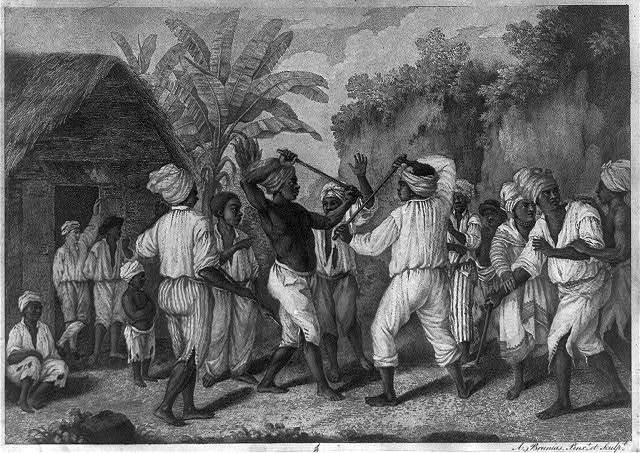Written by Kennie Etienne ’21, African-American Studies Major and Anthropology Concentration, and
she/her/her

Stick Fighters – Canboulay Uprising of 1881
“Canboulay” is a live reenactment that takes place every year during Trinidad & Tobago’s
carnival season. The play is widely popular and is meant to display and pay homage to
Trinidadian enslaved people’s struggle for emancipation from England’s plantation system. The
play was written and co-created by Professor Tony Hall, who was also my Carnival Arts professor
while I studied at the University of the West Indies last spring.

Stick fighting, also known as Kalenda, is the national martial art of Trinidad & Tobago. In the script, the Canboulay Riots unfold and the audience gets to experience the rising tensions between stick fighters and English officials who are threatening to outlaw Carnival. To the enslaved people, Carnival (or masquerading/“playing mas”) was their only source of entertainment and opportunity to express themselves. In one of the earliest scenes, the local stick fighters bravely gathered in town prepared to fight to protect their right to play mas.
One of the play’s most amusing characters is Captain Baker, who is the British official that addresses the crowd in a pompous and exaggerated accent: “I wish to tell you that it is entirely a misconception on your part, to think that there is any desire on the part of the Government to stop your amusement.” He claims that the British government fears the potential damage that can be caused by carnival traditions like fire breathing. However, it is clear to the audience that there is an insidious agenda to stifle the enslaved people’s creative outlet and source of cultural expression. The stick fighters, both men and women, fearlessly defended their tradition and Trinidadian people have successfully preserved carnival over time. It is now a multimillion dollar global industry, which has come with a new set of issues including co-optation. However, carnival season is also a source of job creation and a thriving music industry as well.

Professor Tony Hall passed away on April 27 of last year, shortly after my cohort left Trinidad early due to the pandemic. “His pioneering work on local television and theatre, both here and abroad, is recognized. He worked with the TTW to present the Playwrighting Workshop since the Belmont days,” the Trinidad Theatre Workshop said in a post on Facebook. Professor Hall taught us not just about the arts but about what it means to be intentional and authentic; his contributions and presence will be with my study abroad cohort permanently.


